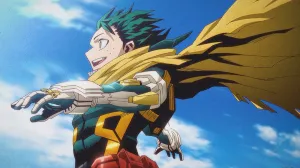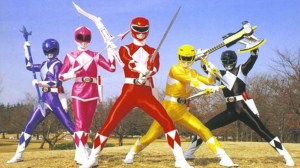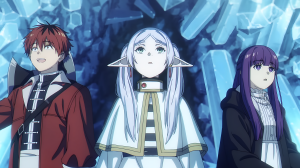You might not know his name, but you’ll certainly recognize actor Martin Donovan, as he’s starred in a number of projects for screens both big and small, including Big Little Lies, DC’s Legends of Tomorrow, and one of the biggest films of 2020, Tenet. What often excites fans when they see Donovan show up in a project is that his character’s motivations are rarely ever clear, as his charm and charisma easily win over not only the other characters in the story, but also audiences, only for him to exploit those weaknesses and reveal nefarious intentions. His latest mysterious role is in Redemption Day, which hits theaters on January 8th and lands on Digital HD and On Demand on January 12th.
Videos by ComicBook.com
Having just returned home, decorated U.S. Marine Captain Brad Paxton’s (Gary Dourdan) wife, Kate, is kidnapped by a terrorist group while working in Morocco. He is forced back into action for a daring and deadly operation to save the woman he loves.
ComicBook.com caught up with Donovan to talk about his complex characters, diving into Redemption Day, and what might have happened to his Ant-Man character.

ComicBook.com: 2020 was a difficult year for everyone around the world, as everyone had to put their lives on hold. You’re a busy actor and pop up in a lot of different movies and TV shows, all of which were paused for most of the year. Obviously there’s not a silver lining to all of the tragedies, but with acting projects put on hold, did you get to reflect during that time off or were you mostly just anxious to get back to work as soon as possible?
Martin Donovan: I have never, ever in my — I won’t even say how many years of doing this — have I ever said, “Gee, I’ve been working too hard. I need a vacation.” That’s never passed my lips. I just want to work. I love to work. So I’ve never been on a television series for three or four seasons in a row, a real grind where I have a role that’s major, that’s heavy in the show. And that kind of work does wear you down. I have friends who’ve done that and I know how hard that is, but I’ve never been subjected to that. The series that I have been series regular on have either never lasted more than one season, even if that, so I’ve never had that long, multi-year grind or anything. Movies are always pretty short and sweet. And then the rest of the time I’m doing recurrings or guest stars and stuff like that.
So there were various jobs that were coming up in the spring and then COVID hit. And then they kept saying, “Well, now we’re going to start in summer,” and so forth. Of course, they didn’t really get going until, in my case, until the fall, but then I got offered this Netflix series, which brought me here to Pittsburgh, which I was very happy to get. So I’m happy. I feel lucky to be working. There is now, from what I can tell, a lot of production going on in various places, which is a good thing. L.A., Vancouver, London, Atlanta, the usual places.
With all these projects, what is typically the driving force of what excites you about a project? And, more specifically, what was it about Redemption Day that excited you?
It’s kind of pathetic. It’s like, if they want me, they must have taste. I’m kind of joking, but I’ve had this weird, fringey career. Starting out back in the ’90s I was working in independent films. The ’90s, I was quite busy doing lead roles in independent films, but I never broke out into the studio exposure thing. So I never became a, I don’t know, a brand. I was just, thankfully, a working actor. And so it’s been a very weird career as far as that goes, because I’m not on the talk shows or on the covers of magazines or anything like that, I’m still surprised that people know who I am. And this is not false modesty. I really am still shocked when directors come to me or whatever and they actually know my work.
So that means they’re paying attention and they’re not necessarily paying attention to all the mainstream stuff. They’ve seen stuff that’s maybe a little off the beaten path or whatever. I’m always happy to know that they know my work and they want me to be in it, so then it just comes down to the script. It’s the part. I read the part and it’s like, “Can I do this well enough in my head? Is this something I feel like I can do?”
There is a wide range of other things that happen. “Wow, this is a part that I haven’t done before. I haven’t done a guy like this before.” That makes it exciting. In the case of Redemption Day, I mean, first of all, I’d never been to Morocco. That certainly was appealing. And the guy I play, I’m always interested in those guys that are for lack of, I don’t know, deep state, shall we say, guys that are in the intelligence business, in the upper echelons of government and in the shadows, the stuff that goes on in an international incident like this that we don’t even know about.
That kind of stuff interests me. And I am fascinated just of the psychology of these guys, because they’re not the type … there’s no way I could do what they do. That’s not how I view the world. I don’t think about the world that way. I don’t want to be in those rooms with those guys, but I’m fascinated to play them and to see if I can find some way in and find some humanity in them.
I think what I love about every time I see you pop up in a movie, it just brings me such joy because you are one of these fringe characters whose morals and motivations you don’t always know right away. So it’s always an experience of getting to see, “Okay, is he actually good, good? Or is he bad, good? Or is he bad, bad?” You’re always in these gray areas. And so with this character specifically, since your screen time isn’t as much as some of the other performers, were you then allowed to construct your own backstory or did you mostly just stick with bringing this character to life as much as what is in the script?
It’s a funny thing. When I was a very young actor, we were taught to create a back story and to even write a biography or whatever. I find that as I got older and I did more and more work that I try to grasp the guy and the structure of the scene and how it fits into the film, into the story. And then I don’t even think about the back story. I just feel like I do it unconsciously. I just try to be present, which is really the job we’re supposed to do, is to be present in the scene. And I can’t, even if it’s a lead role, there’s only so much one can do in a scene to convey that, otherwise it’s going to be a mess. You can’t act your history. You can’t act your past.
So, for me, it’s about … what the writer’s and the director’s job is, is to tell the story and the audience is going to fill in a lot of the blanks or imagine who this guy is and what his history is. I can’t act that. I can only be present in the moment, concentrated and listening to the other actor and following the scene as it’s written. And then, with any luck, a character emerges from that and people are going to project, the audience is going to project everything onto the characters anyway. I mean, that’s what we do when we watch a performance, we are projecting all the time. We’re imagining this person, what his history is, and everybody’s going to have a different projection that’s going to be about their lives and their life experience that they’re going to be projecting onto this character. So I don’t know if that makes sense.
No, it does. It sounds like you know you’re one piece of the puzzle and you deliver that piece to the best of your ability, knowing that the rest of the cast and filmmakers are also bringing their own pieces to tell a complete picture.
Yeah, all I can do is do my job. And I have to believe that the story and the script and the editing and the director will make it compelling and interesting.
You mention that you’ve never really been had a “brand” and aren’t doing the talk shows or magazine covers, but you’ve been involved in some blockbusters, like Ant-Man. Interestingly, since you survive the movie and avoid capture, fans have been theorizing for years about what happened to your character. I wondered if you were aware of all the theories fans have had about your character or if you had any opinion on what happened to him? Or did he just escape the building and immediately get hit by a bus and die?
I am aware but maybe not to the extent that you’ve just described. I don’t follow it closely, so I’m not aware. I wasn’t aware that he’s still a major subject and I don’t know what the plans are for him, to be honest with you. I don’t know where they’re going with that. But yeah, I mean, I’m here. They know where to reach me. I’m sure the theories are quite wild. And your last point about being hit by the bus might be the one that happened. Who knows?
That might be one of the less glamourous moments for a Marvel character.
Yes, and I do know that I’m in good company if I do not return, because of that list I saw, the characters and the actors who were in a Marvel Universe film and then never came back. So I’m in good company. There’s some good people.
*****
Redemption Day hits theaters on January 8th and lands on Digital HD and On Demand on January 12th.








